01 Jan 2015
Am I Abusing Alcohol?
If you’ve ever thought about how much you drink, if your habits are healthy or if you abuse alcohol, you’re ahead of most people. Many people abuse alcohol but avoid thinking critically about their actions or what it means.
Do You Have A Problem With Abusing Alcohol?
It’s easier to ignore potential problems with drinking, but it can also be confusing to understand what constitutes normal drinking, alcohol abuse and alcoholism. While alcohol abuse doesn’t necessarily lead to alcoholism, it can put you on that path. Learn more about what this means and find out if you abuse alcohol.
What Is Moderate Drinking?
 There’s no hard and fast rule for what constitutes alcohol abuse, but there are guidelines for what’s considered to be moderate drinking. Some experts would say that anything over moderate drinking is abuse, while others would argue that this viewpoint is too extreme.
There’s no hard and fast rule for what constitutes alcohol abuse, but there are guidelines for what’s considered to be moderate drinking. Some experts would say that anything over moderate drinking is abuse, while others would argue that this viewpoint is too extreme.
According to guidelines set by the U.S. Department of Agriculture and the Department of and Human Services, moderate drinking for a woman is up to one drink per day and for a man up to two drinks per day.
What Are The Signs Of Alcohol Abuse?
Everyone is different and responds in varied ways to alcohol. Some people can drink more and be less affected. What’s more important than the guidelines for moderate drinking are the behaviors, consequences and motivations regarding your drinking. Look critically at your drinking habits for these signs of alcohol abuse:
- Your drinking causes you to neglect responsibilities – This could mean that you forget to pick up the kids from school or that you can’t drive them to activities because you are under the influence. Maybe you neglect to spend time with an elderly parent because you would rather be drinking.
- You drink to relax or to cope with negative emotions – Using alcohol to feel better is called self-medication and is a sign of abuse. The occasional drink after work to unwind is not usually a problem, but can be when it becomes a habit.
- You drink even when it could be dangerous to do so – For example, when you are about to get behind the wheel of your car or operate another type of machinery.
- You drink in spite of the problems it causes in your relationships – If your partner urges you to drink less and you don’t, or if you fight about your drinking patterns often, you are letting alcohol deteriorate your relationship.
- Your drinking causes legal problems – Such as a DUI or an arrest for behavior caused by being drunk.
What Is Alcoholism?
If you can identify any of the above signs in your behaviors when it comes to drinking, you’re abusing alcohol. It’s important not to confuse this with alcoholism.
Alcoholism means being physically dependent on alcohol. Alcoholics drink a lot every day. They can’t control how much they drink, even if they want to cut down. They feel physically sick if they can’t drink. There are big and important differences between abusing alcohol and being an alcoholic.
How To Change Your Drinking Patterns
Abusing alcohol doesn’t always lead to alcoholism. Most people who abuse alcohol can change their behaviors before it gets to that point. You have the ability to make changes now, for the better.
Enlist the support of a friend or partner and tell this person that you want to cut back. Come up with better ways to cope with stress, such as exercise or meditation. Set goals that are attainable and work toward them.
If you try these strategies and still find it hard to change your patterns, consider working with a therapist or counselor. With a little guidance you can learn to have a healthy relationship with alcohol.
If You Or Someone You Love Is Abusing Alcohol – Don’t Hesitate –
Call Us Now To Begin A Life Of Healing And Freedom!
03 Nov 2014
Drinking And Stress: A Dangerous Combination
Do you have a glass of wine to unwind in the evening after work? Do you reach for a cocktail after a stressful situation? Do you start to look forward to your evening drink earlier in the day when you’re feeling stressed? If you can say yes to any of these questions you are probably using alcohol to cope with stress. Drinking can make you feel momentarily looser, calmer and more relaxed, which is why many people use it to unwind. Doing so is a dangerous habit, though. You can make your stress worse by drinking and even risk becoming dependent on it.
Alcohol As Stress Relief
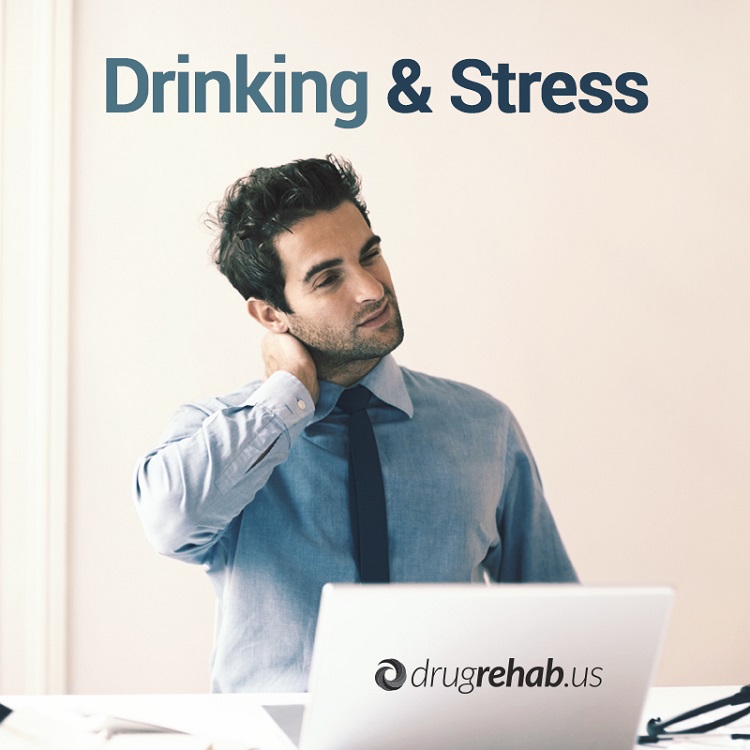 Many people turn to drinking to relax and ease the everyday stresses of modern life. Most of us are busier than ever. We have demanding jobs, and in a rough economy, holding onto those jobs becomes crucial. We often sleep poorly and get too little exercise. Our diets are not always the best. On top of all this you may have other stresses in your life: troubled relationships, financial problems, trauma, a death in the family, etc.
Many people turn to drinking to relax and ease the everyday stresses of modern life. Most of us are busier than ever. We have demanding jobs, and in a rough economy, holding onto those jobs becomes crucial. We often sleep poorly and get too little exercise. Our diets are not always the best. On top of all this you may have other stresses in your life: troubled relationships, financial problems, trauma, a death in the family, etc.
Why wouldn’t you want to drink to feel better? Hanging out with friends at the bar and having a few cocktails or beers are fun activities. It’s no wonder many of us engage in drinking to diffuse stress. In the short term it can make you feel better, especially when you add in the socializing time with friends. In the long term, however, drinking can send your stress levels spiraling upward.
The Stress-Drinking Cycle
Researchers have shown that stress and drinking effect each other and result in a cycle of interaction that leads to worsening stress. One study found that alcohol changes how the body copes with stress. Drinking can actually reduce the stress hormones your body produces in difficult situations, but it also prolongs the tension that you feel associated with stress.
On the flipside, stress changes the way alcohol impacts your mood. When you are stressed and you drink you will crave more alcohol. You will also find that the positive feelings you normally get from alcohol are reduced. This interaction between stress and alcohol that goes on inside your body means that drinking actually worsens your stress. As your stress gets more intense, you may drink more and the cycle continues. Drinking will never cure you of chronic stress.
If you continue to use alcohol as a means of relaxation and stress relief you run the risk of falling into the stress-alcohol cycle. And if you land in that cycle you could end up becoming dependent on alcohol. Alcoholism is a disease and it takes a serious toll on both the mind and the body. Becoming an alcoholic means more stress in addition to physical health problems.
Healthy Stress Relief
One of the ways in which friends can be good for your mental health is when you interact in a social group. Having good social support can make you more resilient in the face of stress. Hanging out with friends and family, talking, laughing and having a good time helps to relieve stress that you already have. If you can keep the social engagements, but take out the alcohol, or at least reduce it significantly, you will have a powerful prescription for managing your stress. Add to your social interactions a healthy diet, plenty of exercise, downtime engaging in fun activities and you have a healthy stress relief plan and no need for that next drink.
Do You Find Yourself Drinking More And More To Relieve Stress? Call Us Now For Help!
22 Oct 2014
Alcoholics And Their Excuses
Alcoholism is a disease. It is chronic and it requires lifelong treatment to stay sober. While going through rehab and staying sober are challenging, the first and biggest step for an alcoholic is to get past the excuses and admit to having a problem with drinking.
 Heavy drinkers deny having a problem for a variety of reasons. They fear what happens in detox. They worry about what people will say. Most of all they fear what life will be like sober.
Heavy drinkers deny having a problem for a variety of reasons. They fear what happens in detox. They worry about what people will say. Most of all they fear what life will be like sober.
In spite of the fears, it is important for alcoholics to get help. The consequences of not doing so may be serious.
Pregnant alcoholics risk fetal alcohol syndrome. All alcoholics face health consequences like liver or heart disease. Accidents are common among alcoholics. They also must face the possibility of losing relationships.
Excuses Of An Alcoholic
If you have a loved one who drinks too much, confront him or her. Be prepared to hear this list of excuses alcoholics give to explain drinking:
- I need to drink to feel comfortable in social situations – Many people face social anxiety. It is a real disorder, in fact. It is not uncommon to self-medicate with drugs or alcohol, but it is not a good excuse. Self-medicating is dangerous. Therapy can help anyone overcome social anxiety.
- I’m only hurting myself – Addicts are great at claiming that their habit is their own business. Remind your loved one that drinking affects everyone else too. When drinking makes the alcoholic remote, angry or temperamental, everyone suffers. When drinking costs the family money, everyone suffers.
- I need alcohol to cope with work stress – This is a common excuse. Stress relief is an important part of being healthy and a drink or two on tough days does not make one an alcoholic. Many jobs are stressful and drinking feels good. This may be why there is so much alcoholism in the healthcare field and other high-stress careers. It isn’t an excuse for heavy drinking, though. There are many other ways to cope with stress.
- This is just who I am – This excuse is an outright lie. Alcoholics weren’t born drinking. They change to become an alcoholic and they can change again to get sober.
- I’m not as bad as other people – Comparing a drinking problem to a worse problem in someone else is a very weak excuse for drinking. Being an alcoholic exists outside of everyone else. When considering a personal problem, like drinking, it makes no difference what everyone else is doing.
Professional And Caring Help Is Needed
The list of excuses that alcoholics make could go on and on forever. They will come up with anything under the sun to justify continuing to drink and to avoid getting help. When the excuses finally run out, you can hopefully convince your loved one to get much-needed help. Only professional therapy and counseling, along with your support, will be enough to overcome all the excuses.
See How To Recognize The Signs Of Addiction Denial In A Loved One
If Your Loved One Needs Help With A Drinking Problem, Reach Out To Us Today – We Will Help You And Your Loved One Take That First Step!
02 Oct 2014
What Hangovers Can Tell You About Your Drinking
Drinking is a risky behavior. You can have an accident. You can drink too much, black out and forget what happened the night before. You can end up saying things you regret. And, of course, most of us have experienced the dreaded morning-after hangover. If you drink responsibly and moderately, you don’t have to worry about these things.
Types Of Hangovers And What They Say About You And Your Drinking
If you are questioning whether your drinking habits are risky or getting out of control, let your hangovers be your guide; they can be illuminating.
The Occasional, Regrettable Hangover
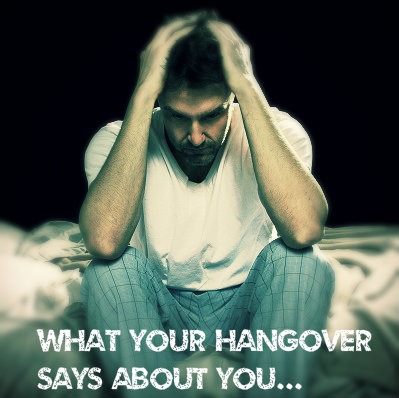 An occasional hangover is not that unusual for the moderate social drinker. We all have those regrettable moments when we go one drink too far. The next morning you wake up with your tongue stuck to the roof of your mouth, the room spinning and your head pounding. You try to remember what went wrong the night before and then slug back water in a desperate attempt to feel normal again.
An occasional hangover is not that unusual for the moderate social drinker. We all have those regrettable moments when we go one drink too far. The next morning you wake up with your tongue stuck to the roof of your mouth, the room spinning and your head pounding. You try to remember what went wrong the night before and then slug back water in a desperate attempt to feel normal again.
This type of hangover, if it occurs once or twice a year, is probably not a big deal. And it is not likely to be indicative of a drinking problem. It’s normal to make this mistake and only if you never drink or you rule your drinking with an iron fist will you never have a hangover.
The Slight, But Constant Hangover
A hangover can come in a range of severities. For most normal drinkers, the worst hangovers are rare because we learn our lessons, at least for a while. The normal reaction to a bad hangover is to avoid drinking too much in the future. But what if you drink regularly and wake up most mornings with mild symptoms? Maybe you have a slight headache or you just feel unrested, like you didn’t sleep well.
This mild kind of hangover, occurring several times a week, is a sign that you are developing a drinking problem. If you truly drink moderately, meaning one to two drinks at a time no more than a few nights a week, you shouldn’t feel bad in the mornings. These little hangovers are telling you that you are drinking too much and you are drinking too often. Just because you aren’t experiencing a full-blown morning-after event doesn’t mean you aren’t abusing alcohol. Slow down and cut back now before it gets worse.
The “I’ll Never Feel This Way Again” Hangover
I’ll never drink like that again! Have you ever said this before? Most of us have, which is fine if you act on that sentiment. If you find yourself saying or thinking this, but tack on an “until next weekend,” you have a problem. Not adjusting your behavior in response to a bad hangover is not normal and it indicates that you are drinking too much too often. Try to cut back and if you find that you are struggling to do so, you may need some professional help or a support group.
The Hair Of The Dog Hangover
What if you have regular hangovers and to get through them you have a little morning drink? This is a sign that you are already on a dangerous path. If you need a drink to help you feel better in the morning, you could be well on your way to alcoholism. Stop drinking now and turn to professionals for help. If you’re not sure where to turn, start with a trusted friend or family member who cares about you. You need support now more than ever.
Listen To What Your Body Is Telling You And Get Alcohol Abuse Help
Hangovers are no fun and how often and how badly you have them, and how you respond to them, can tell you a lot about your drinking and whether it’s problematic. Listen to what your body is telling you and adjust your drinking behaviors or get the help you need.
Learn More – Moderation vs. Abstinence: Which Works Best For Problem Drinkers?
09 Sep 2014
The Long-Term Effects Of Underage Drinking
Prom, graduation and the start of summer vacation are all key times that trigger a rash of underage drinking. Unfortunately, teenage drinking is a year-round problem. Underage drinking can have some very serious immediate consequences.
Drinking too much can make a young person sick. It can lead to poor decision-making. It can lead to accidents. At the very least, drinking can make a young person feel awful the next day. What many young people fail to consider is that there are lasting consequences too.
Effects Of Long-Term Underage Drinking
Whether you’re a teen yourself or the parent of a teen, understand the long-term implications of underage drinking:
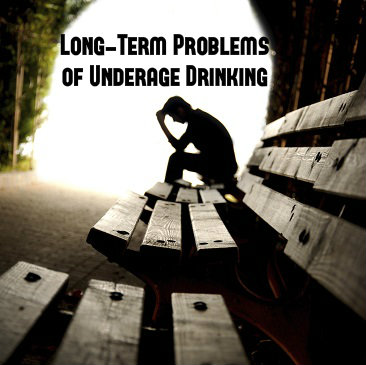 Legal Troubles – Most teens don’t think about getting caught before they drink, but many make bad choices when they do. These poor decisions can get a teen arrested for disorderly conduct, breaking and entering, drunk driving and more. The legal consequences can follow a young person for years, interfering with applications for college, scholarships or for jobs.
Legal Troubles – Most teens don’t think about getting caught before they drink, but many make bad choices when they do. These poor decisions can get a teen arrested for disorderly conduct, breaking and entering, drunk driving and more. The legal consequences can follow a young person for years, interfering with applications for college, scholarships or for jobs.
- Chronic Health Problems – When drinking starts at a young age and continues into adulthood, the accumulated effects can mean serious health problems. These may include pancreatitis, cirrhosis of the liver, hepatitis, high blood pressure, anemia and nutritional deficiencies. Drinking at a young age has also been shown to negatively impact the development of bone density, which can later result in osteoporosis
- The Brain – Drinking impacts the developing adolescent brain and causes problems that will continue into adulthood. It can cause permanent problems with memory and cause actual physical damage to the brain. The part of the brain involved in memory, the hippocampus, can be seen in scans to be smaller in people who drank a lot during adolescence than in their non-drinking peers. Other negative impacts include reduced attention spans, ability to think spatially and to plan.
- Accidents, Injuries, And Death – Drinking can lead to any number of accidents from drowning to falling to auto collisions. These have serious short-term consequences, but they can also impact a young person for the duration of their life. If an accident kills a young person, that life is over forever. For the underage drinker that causes a fatality, living with the guilt is a lifelong burden. Injuries may also stick with a young person and cause long-term health problems.
- Addiction – Drinking for the first time as a teen is a risk factor for developing an addiction or a substance abuse disorder later in life. In other words, underage drinkers put themselves at risk for having lifelong struggles with alcoholism or drug addiction.
- Family Problems -When young people drink it can impact the family in many negative ways. All of the terrible consequences that befall the teen drinker, like legal troubles, health problems and accidents, affect the dynamic of the family. Just one drinking incident with bad consequences can start a family crisis and everyone suffers.
The consequences of underage drinking are not difficult to imagine. Anyone who has ever had one drink too many knows just what can happen as a result. What most people, young and old, never think about are the long-lasting consequences. Teens who drink risk becoming addicted, damaging their brains, living with the guilt of hurting someone and having chronic health problems. With all of these and other possible negative outcomes, why would any young person choose to drink?
If You Know A Young Person Who Is Tempted To Drink Or Is Struggling – Call Us Now – We Can Help
A long-standing philosophy of alcoholism treatment has been that total abstinence is necessary and that there is no possibility that someone with a drinking problem could handle moderate drinking. Today we know a lot more about addiction thanks to research and we know that it is more complicated than was previously thought. So, is it possible for a problem drinker to continue drinking responsibly and in moderation? Or is abstinence the only way to go?
What Does Moderation Mean?
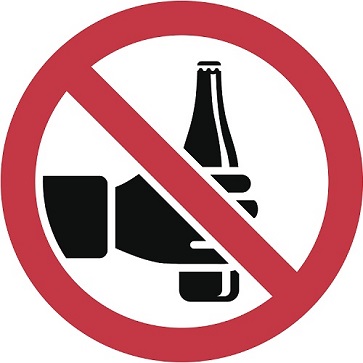 One immediate problem comes to mind when debating the possibility of moderate and responsibly drinking, and that is how to define it. Many problem drinkers and alcoholics are in denial about how much they drink and how much of an issue it is. It is not difficult to imagine that an alcoholic attempting moderation would use it as an excuse to keep drinking all the while claiming his habit was surely moderate.
One immediate problem comes to mind when debating the possibility of moderate and responsibly drinking, and that is how to define it. Many problem drinkers and alcoholics are in denial about how much they drink and how much of an issue it is. It is not difficult to imagine that an alcoholic attempting moderation would use it as an excuse to keep drinking all the while claiming his habit was surely moderate.
At a basic level moderation means setting reasonable drinking limits and sticking with them. According to the organization Moderation Management, which guides problem drinkers toward reducing their alcohol consumption, men should have no more than four drinks at one time and no more than 14 per week. For women, that amount is three at once and no more than nine per week. Both men and women are supposed to restrict drinking to three to four days each week.
Does Moderation Work For Problem Drinkers?
There are many proponents of moderation who claim that problem drinkers can more successfully establish a healthy relationship with alcohol by moderating than by abstaining. Research does seem to support this viewpoint. One study included participants, all of whom were problem drinkers to varying degrees, who attempted to moderate their habit rather than stop drinking completely. They used a website application designed to guide them through the process. Some used a simple website, while others used an interactive application.
The problem drinkers that used the website alone were able to raise their abstinent time during each month by about four percent. On days they did drink, their blood alcohol content dropped by 50 percent or more, which indicates that they reduced the amount of drinks significantly. For participants using an interactive application, the number of days without drinking at all doubled. Those that used both tools were able to reduce their drinking to fully moderate levels across the board.
Can True Alcoholics Drink Responsibly?
The study that showed moderation could be successful included some very heavy drinkers. However, they did not include people who experienced withdrawal, a key characteristic of alcoholism. So far there is little to no evidence that moderation could be possible for anyone who is seriously dependent on alcohol. In fact, many experts are in agreement that trying to drink moderately could be dangerous for true alcoholics.
This doesn’t mean that moderation is not a great way to help many people. Among all people who have a problem with drinking, most of them have not yet crossed the line into alcohol dependence. If these people can be reached with tools to help them change their drinking from a problem to responsible moderation, the incidence of alcoholism, and all the problems that go along with the disease, could be reduced.
For those people who are already physically and psychologically dependent on alcohol, abstinence is probably the only option. But, for millions of people across the country for whom drinking is a problem, moderation may be a strong motivational tool for making positive changes. The philosophy of abstinence only has been around for a long time, but a shift is starting to occur and it may be for the better.
Learn More About The Steps Of Alcohol Detox
22 Aug 2014
Heavy Drinking Tied To Metabolic Syndrome
Metabolic syndrome is the term that doctors and public health officials use to describe a collection of health concerns that significantly increase your chances of dying from heart disease or certain other causes. While some of the risks associated with heavy alcohol consumption are well established, researchers know relatively little about the potential connection between heavy drinking and the development of this syndrome. In a study published in May 2014 in the journal Alcoholism: Clinical & Experimental Research, researchers from Japan’s Hyogo College of Medicine assessed the impact that excessive alcohol intake has on the metabolic syndrome risks of middle-aged men.
Metabolic Syndrome
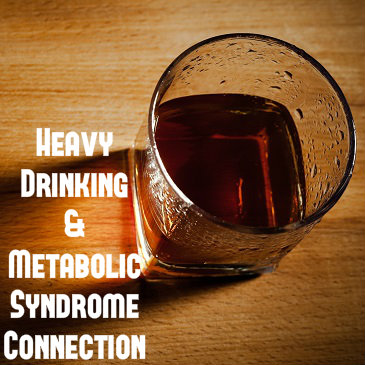 Metabolic syndrome gets its name because it involves changes in your normal metabolism, or the processing of chemical reactions inside the brain and body. Strictly speaking, the syndrome is not an illness; instead, it is a collection of risk factors for illness.
Metabolic syndrome gets its name because it involves changes in your normal metabolism, or the processing of chemical reactions inside the brain and body. Strictly speaking, the syndrome is not an illness; instead, it is a collection of risk factors for illness.
Specific factors involved in the onset of metabolic syndrome can include having a tendency to carry significant amounts of excess weight around your midsection, having a high count of a bloodborne fat called triglyceride, having low blood levels of HDL or “good” cholesterol (which removes excess LDL or “bad” cholesterol from your bloodstream), having abnormally high blood glucose or blood sugar levels and having unusually high blood pressure. As a rule, doctors consider making a diagnosis in people affected by a minimum of three of these risk factors.
Compared to the general population, a person with metabolic syndrome has a roughly 100 percent greater chance of developing some form of heart disease, the National Heart Lung and Blood Institute reports. The presence of the syndrome also increases the odds for developing type 2 diabetes by about 400 percent. Physical concerns most commonly associated with a metabolic syndrome diagnosis include maintaining a sedentary lifestyle and carrying enough body weight to qualify as overweight or obese. Other potential concerns include having an unusual resistance to the blood sugar-lowering effects of a human hormone called insulin, being older and having a genetic predisposition toward risk factors for the condition.
Excessive Or Heavy Drinking
Heavy drinking is a public health term used to describe excessive alcohol consumption on any given day or over the course of any given week. Men partake in this form of consumption when they drink more than four servings of alcohol per day or more than 14 servings per week. Women partake in heavy drinking when they consume more than three servings of alcohol per day or more than seven servings per week. Some heavy drinkers also qualify as binge drinkers by consuming enough alcohol to reach a legally intoxicated state in a single, fairly brief bout of alcohol intake. Participation in heavy drinking is conclusively linked with increased risks for developing diagnosable problems with alcohol abuse and/or alcoholism.
Examining The Connection Between Heavy Drinking And Metabolic Syndrome
In the study published in Alcoholism: Clinical & Experimental Research, the Japanese researchers used an assessment of a group of middle-aged men to compare the risks for metabolic syndrome among people in this age group who don’t drink alcohol, occasionally drink heavily and regularly drink heavily. For the purposes of the study, heavy drinking was defined as the consumption of at least 66 grams (2.3 oz) of pure alcohol on any given day when alcohol intake occurred. This is equivalent to the amount of alcohol in 3.8 standard drinks.
The researchers concluded that, compared to middle-aged men who don’t drink, men in this age group who occasionally participate in heavy drinking have a roughly 94 percent higher chance of developing metabolic syndrome. They also concluded that middle-aged men who regularly participate in heavy drinking have a roughly 48 percent higher chance of developing the syndrome. The occasional heavy drinkers are considerably more likely than their non-drinking counterparts to carry significant amounts of excess weight around their midsections. The regular heavy drinkers are considerably less likely than their non-drinking counterparts to have high blood sugar levels.
It may seem odd that occasional heavy drinkers apparently have substantially higher chances of developing metabolic syndrome than regular heavy drinkers. The study’s authors tentatively attribute this counterintuitive finding to the lowered risks for high blood sugar among people who regularly consume excessive amounts of alcohol, as well as to the increased risks for abdominal obesity among people who occasionally consume excessive amounts of alcohol. The authors also specifically note that the cardiovascular (heart and blood vessel) risks for metabolic syndrome apply to both occasional and regular heavy drinkers.
30 Jul 2014
Is Alcohol Ruining Your Relationships?
You don’t need to be an alcoholic to have a problem with alcohol. Many people still believe that raging alcoholics are the only people who abuse alcohol. There are many signs that indicate you may have a problem, and one of the biggest is the way in which drinking effects your relationships. Whether it’s with your kids, spouse, parents or anyone else important to you, if alcohol is negatively impacting your relationships with other people, you have a problem.
Relationship Problems Signal Alcohol Abuse
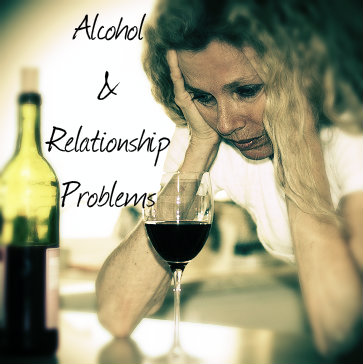 Having a problem with alcohol does not look the same from one person to the next. There are varying degrees, from the initial stages of abuse to full-blown non-functioning alcoholic. If you are questioning your relationship with alcohol, you should be aware of the signs of abuse. One of the most obvious ones is continuing to drink in spite of problems it creates in your relationships. Maybe you and your spouse only fight when you’re drunk. Or, you forget to pick your kids up from activities because you’re out at the bar with friends. Whatever it is, if drinking is at the root of a problem in one of your relationships, you are abusing alcohol.
Having a problem with alcohol does not look the same from one person to the next. There are varying degrees, from the initial stages of abuse to full-blown non-functioning alcoholic. If you are questioning your relationship with alcohol, you should be aware of the signs of abuse. One of the most obvious ones is continuing to drink in spite of problems it creates in your relationships. Maybe you and your spouse only fight when you’re drunk. Or, you forget to pick your kids up from activities because you’re out at the bar with friends. Whatever it is, if drinking is at the root of a problem in one of your relationships, you are abusing alcohol.
Alcohol Makes You Argue
One of the things many of us like about drinking is that it makes us feel bolder. Alcohol works in the brain to lower inhibitions, which is why you may feel more inclined to speak your mind when you’ve been drinking. An argument you would never start when sober often feels right when you’re tipsy. Arguing on a regular basis, especially unfruitful arguments fueled by alcohol, is not good for any relationship. Furthermore, many people also get aggressive when drinking. If you are normally a peaceful person but you feel angry when you drink, the people you care about around you are the ones who will suffer from your wrath.
Alcohol Takes Priority in Your Life
Constant arguing is bad for your relationships, but so is neglect. Another common relationship problem fueled by drinking is misplacement of priorities. If your spouse feels neglected because you would rather go out drinking with buddies, you are placing alcohol ahead of her on your list. The same can often happen with kids. Did you miss a school event or a soccer game because you were too drunk to get there? Your children can feel as if they are unimportant to you, which will have a terrible impact on your relationship with them.
You Deny Having a Problem
When your loved ones approach you to discuss your drinking and how it impacts them, do you brush it off? Do you refuse to admit the effect alcohol is having on your life and relationships? If so, this can further exacerbate the issue. If you can admit to the problem and agree to take steps to correct it, your loved ones will most likely support you. On the other hand, if you continue to deny the problem, you will only further damage your relationships. No change can happen until you open your eyes and see what alcohol has done to the relationships you have with the people you care about.
Your drinking may have already trashed any number of relationships in your life, but take away something positive from this. If you can take a step back and see what impact alcohol has had, you are in a position to make changes before it gets worse. Before you succumb to the disease of alcoholism, you can take steps now to turn your life around. Slow or stop your drinking, repair your relationships and move on with your life.
Learn More About The Link Between Alcoholism And Substance Abuse Among Women With Bipolar Disorder
IF YOU OR SOMEONE YOU LOVE IS STRUGGLING WITH ALCOHOL – PICK UP THE PHONE AND CALL US NOW – HEALING AND PEACE CAN BE YOURS TODAY!


